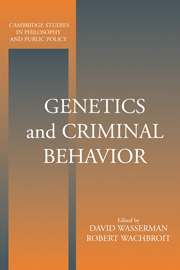Book contents
- Frontmatter
- Contents
- List of Contributors
- Acknowledgments
- 1 Introduction: Methods, Meanings, and Morals
- PART I
- PART II
- 8 Crime, Genes, and Responsibility
- 9 Genes, Statistics, and Desert
- 10 Genes, Electrotransmitters, and Free Will
- 11 Moral Responsibility without Free Will
- 12 Strong Genetic Influence and the New “Optimism”
- 13 Genetic Predispositions to Violent and Antisocial Behavior: Responsibility, Character, and Identity
- Index
10 - Genes, Electrotransmitters, and Free Will
Published online by Cambridge University Press: 05 June 2012
- Frontmatter
- Contents
- List of Contributors
- Acknowledgments
- 1 Introduction: Methods, Meanings, and Morals
- PART I
- PART II
- 8 Crime, Genes, and Responsibility
- 9 Genes, Statistics, and Desert
- 10 Genes, Electrotransmitters, and Free Will
- 11 Moral Responsibility without Free Will
- 12 Strong Genetic Influence and the New “Optimism”
- 13 Genetic Predispositions to Violent and Antisocial Behavior: Responsibility, Character, and Identity
- Index
Summary
There seems to be evidence of a genetic component in criminal behavior. It is widely agreed not to be “deterministic,” by which discussions outside philosophy seem to mean that by itself it is not sufficient to determine behavior. Environmental factors make a decisive difference – for that matter, there are nongenetic biological factors – in whether and how genetic endowment manifests itself phenotypically. Moreover, even if its manifestation were inevitable, its bearing on criminal behavior apparently turns on general personality traits on the order of “impulsivity” that under different conditions of life could take very different forms. My concern in this chapter is not with “genetic determinism”; it should be obvious that the notion makes sense only if determinism admits of more limited (and less worrisome) forms than the one involving universal causal necessitation that philosophers have in mind by the term. Instead I want to ask whether current accounts of the link between genes and criminal behavior would manage to undermine free will anyway, even apart from worries about determinism (Greenspan 1993, 31–43).
I eventually suggest that some of the other terms in this area should also be pried apart. In particular, the genetic accounts in question may well be thought to undermine freedom and yet to allow for responsibility in the sense of blameworthiness.
- Type
- Chapter
- Information
- Genetics and Criminal Behavior , pp. 243 - 258Publisher: Cambridge University PressPrint publication year: 2001
- 3
- Cited by

